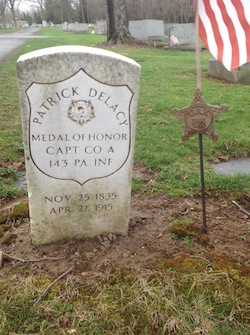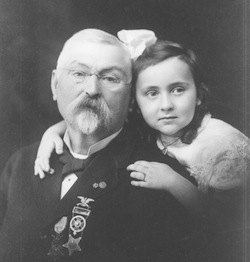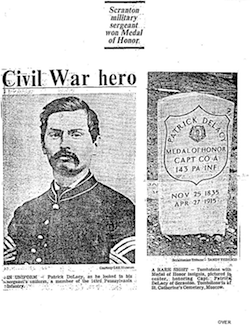
Last year on the 4th of July we made our annual family trip to Gettysburg. I think that there were about 11 of us and we picked up several of our friends from Gettysburg. There were 14 of us present when we put a wreath in front of the 143rd PVI Monument.
Later that day while we were walking around the first day’s battle area, we ran into the group at the rededication of the 151st PVI Monument. They had a real good turnout; there were about 50 descendants of soldiers from the 151st regiment as well as an honor guard from the 53rd PVI Living History Unit and the band of the 4th Maryland Volunteers.
I remember remarking to my cousin, “It is a shame that we don’t know any other people who had relatives in the 143rd regiment. There is a bunch of us, but we’re all from one family.”
Today, we’re rededicating the headstone of our great-great grandfather, but in a sense we are also rededicating a monument to the entire 143rd PVI regiment. The life and exploits of Captain Patrick DeLacy are inextricably bound up with those of his comrades of the 143rd regiment.
Civil War veterans maintained great allegiance to their Corps, and to a lesser degree to their brigade, but the apex of their war-time identity was always their regiment. This had to be true of Captain DeLacy. He was elected President of the 143rd Survivors Association for 45 consecutive terms. Except for the “honorary” election of General Dana in the first year of the organization’s history, the 143rd Association had only one president until DeLacy’s death in 1915.
This must have been a greater thrill for him than any of the other offices that he held in other veterans’ organizations. Smart politics can get you elected in many organizations, but only love and admiration and respect can get you elected for life in an organization as close-knit as the 143rd Association obviously was.
It’s good to see members of the 143rd Pennsylvania Volunteer Infantry reenactment unit here today as we honor the memory of Captain Patrick DeLacy. In honoring his memory, we honor the memory of all the men of his unit. The 143rd PVI was a good, solid fighting regiment; in fact, it is one of Fox’s 300 Fighting Regiments. For those in the audience who are not familiar with this list, the way to get onto it was easy; you had to have 10 percent of your regiment killed in battle. The 143rd PVI had 151 officers and men killed and another 407 wounded in its 3-year history.
There were a lot of brave men in this regiment. Certainly Ben Crippen who was killed while carrying the flag on the first day at Gettysburg was a brave man. Owen Phillips who saved the flag when Crippen was shot was another brave man. Sergeant Phillips was later killed at the Battle of the Wilderness. Certainly George Engle who went with Captain DeLacy to save the color bearer of the 19th Indiana regiment and that regiment’s colors at Laurel Hill was another brave man. Finally, Roger Cox and John Otto who volunteered with Captain DeLacy to fight the fire between the lines at Spotsylvania to save the wounded from being burned alive were also brave veterans of the 143rd.
One thing that Captain DeLacy had that some of his comrades, notably Sergeants Crippen and Phillips, didn’t have was luck. He was always in the thick of the fighting, and he had a bad habit of getting around the regimental flag, but he was only wounded seriously once, at Spotsylvania, and slightly at Gettysburg and the Wilderness. At Gettysburg he was cornered by two rebels while getting a drink. Fortunately, he had his Enfield loaded and capped. As he stood up, he fired at the two confederates and ran like hell. When they recovered, they both fired at him. One shot went wide, but the other grazed the inside of his right thigh. A little higher and to the left and some of us might not be here. A foot or so higher and DeLacy’s career in the 143rd might have ended at Gettysburg.
At the Wilderness he was wounded by splinters from his own rifle and by fragments of Minnie balls that shattered against his rifle, but these were mere flesh wounds. This was the incident where he won his Medal of Honor, and in retrospect it seems impossible that anyone could run 25 or 30 yards between a couple of thousand Yanks and Rebs who were blazing away at each other and not be killed. As a matter of fact, he made a round trip; on the return trip he had exchanged his useless rifle for the captured Confederate flag. He must have made a great target on the return trip.
The one serious wound that Captain DeLacy received was at Spotsylvania where he was more or less minding his own business. A stray solid shot hit a rail in the top of the entrenchments around the regimental headquarters and drove large wood splinters into his right side. They got most of the wood out of him, but not all, and this wound troubled him considerably in his later life; in fact, he received a disability pension for this starting in 1888.
As I said, DeLacy had a dangerous habit of hanging around the regimental colors. Anyone who has ever seen a reenactment of a Civil War regiment firing knows how the smoke from the rifles quickly obscures the men doing the firing. This is why the regimental colors were so vital as a rallying point. The standard Union color was six feet by six feet, and on its staff it was the highest visible item on the regimental line. It was also the focal point for enemy bullets. It was a bad place to be unless you had a strong death wish. At Gettysburg the 24th Michigan had 11 color bearers killed or wounded. In Stone’s brigade all three of the original color bearers were killed on McPhearson’s ridge at Gettysburg.
According to Major J.H. Stine in his History of the Army of the Potomac, it was Sergeant DeLacy who first noticed that Ben Crippen was not falling back with the regiment. He alerted Captain Conyngham who rallied the regiment on the colors. They were not in time to save Crippen, but they saved the flag.
At the fight at the North Anna crossing, DeLacy rallied a handful of men and saved the regimental colors again. The bulk of the regiment had been driven back, and the acting commander, Major Hughes thought that the colors had been lost. The next morning DeLacy and his shot-up squad showed up much to the delight of Major Hughes and the rest of the regiment. The blackest mark of all on a regiment’s record was the loss of its colors.
At Laurel Hill, DeLacy and Sergeant George Engle went to the assistance of the color bearer of the 19th Indiana and held off the approaching Rebels long enough for the Indiana soldiers to rally and save their colors.
Captain DeLacy was also a compassionate soldier. On May 6th he saved the life of a long-time friend, Herbert Nagel, by putting him in a blanket. With the aid of another soldier from Company A, DeLacy dragged the badly wounded Nagel through the flaming underbrush to the safety of the Union lines.
At Spotsylvania, DeLacy, Cox and Otto exposed themselves recklessly to Confederate muskets as they started a backfire to save the wounded between the lines. The Confederates didn’t fire at them; they recognized the heroism and humanity of the work being done. Many of the wounded probably survived because of this bravery on the part of the three 143rd soldiers.
At North Anna crossing, DeLacy ran ahead of his 40-man contingent as they were returning toward the Union lines and called out to the Union pickets to hold their fire; that friends were approaching the lines.
At Petersburg, while carrying messages between Colonel Glenn of the 149th PVI who was acting brigade commander and the Division Commander, General Griffin, he made a detour on one of his several trips between the front of Rive’s salient and Division Headquarters to warn a Union battery that it was firing perilously close to a number of wounded Union soldiers several hundred yards in its front. The battery commander adjusted the elevation on his guns to ensure that he didn’t hit any of the wounded men.
Captain DeLacy was a man who other men looked up to for leadership. He was the kind of soldier who could rally other soldiers and hold them together because they knew that one way or another, he would get them out of a scrape.
After the war he had an illustrious career in veterans’ organizations. He was an officer for many years in the Pennsylvania GAR, and in 1908-09 he was Commander of the Pennsylvania GAR. He held staff appointments for several years in the Legion of the Medal of Honor, and in 1906-07 he was Commander of the Legion of the Medal of Honor. He was also a senior officer in the First Corps Association, and in 1892-93 was its president.
Captain DeLacy had an equally distinguished post-war civilian career. He was a Deputy Marshall for Western Pennsylvania for four years, the Chief of Police of Scranton for eight years and the Assistant Postmaster of Scranton for seven years. Captain DeLacy served two terms in the Pennsylvania House of Representatives and ran for State Senator, one of the few elections for anything that he ever lost. He served many terms as the Alderman of the Seventh Ward of Scranton.
What was Patrick DeLacy the man like? Oddly enough we don’t know much about him. His oldest daughter Cassie was married to Michael Roche who was the historian of the 143rd regiment. He died at the shockingly young age of 30, leaving Cassie with two small sons. Actually, the younger son, Michael Roche who was my grandfather, was born four months after his father died.
Captain DeLacy raised his two grandsons David and Michael. According to my grandfather, he was a tough old guy who didn’t put up with much from the boys. In fact, the older son ran away from home at the age of 15 to go to work in New York City.
Captain DeLacy must have mellowed with age. My father remembers the Captain calling him “Little Man” and picking him up and kissing him. This is one of my father’s least favorite memories. Dad said he can remember the smell of tobacco on his beard and that the beard scratched.
The Captain must also have had a sense of humor. He told a couple of good stories about himself. Once, when he was still Chief of Police in Scranton, he was at a ball game, and he could tell by the activity of the crowd that there was a gang of pick-pockets working the crowd. He stood up on a wagon and announced to the crowd, “Pickpockets are working this crowd, so be careful of your wallets.” Later in the day, the pickpockets got his wallet.
Shortly before the war, a shoemaker in Scranton who owed DeLacy money for leather approached him with a deal: He would swap a corner lot near his shop for the leather. DeLacy, the hard-headed businessman that he was, held out for payment in cash. He said that he didn’t think that the land in that part of Scranton would ever be worth anything. The lot was at Wyoming Avenue and Lackawanna Avenue, and for years was the busiest corner in Scranton. From the location of the shoemaker shop, this may have been the same shoemaker who was supplying boots to Abraham Lincoln during the war years.
The Captain seemed to have been a tough old guy to the end. There are stories of him taking his cane to wife-beaters when he was in his late 70’s and still Alderman of the Seventh Ward of Scranton. Police brutality is one thing, but imagine what the American Civil Liberties Union could do with a case of Judicial brutality.
One other thing that we know about him for sure is that he wasn’t a teetotaler. After the war someone whom he had saved in battle got his name and address. Every month for the remaining 50 years of his life he got a case of whiskey from this grateful veteran or his family. When the Captain died in 1915, there wasn’t any of it left. Apparently he and his friends had been able to keep up with the supply over the years.
Maybe it’s just as well that we don’t know more about him. It might just cloud the facts of his military career. Maybe it’s best to remember him as he was during the war. The brave, resolute, resourceful soldier who fought in every one of his regiment’s battles, and who was proud to be a member of the fighting 143rd Pennsylvania Volunteers.

Captain DeLacy & Elizabeth Hicks Jacquinot
There is one other person whom we should remember today. Without her efforts for over a four-year period, there would be no new headstone to dedicate today. This is his granddaughter - Elizabeth Hicks Jacquinot who is buried just about 50 feet from here.
Aunt Betty waged a four-year battle with the Veteran’s Administration not just to get a new Medal-of-Honor headstone for her grandfather, but also to get him promoted to Captain. Because of various administrative slip-ups within the regiment, Captain DeLacy was mustered out of the Union Army before his commission as Captain arrived. Only on June 8, 1987 was Second Lieutenant DeLacy promoted to the rank of Captain. This promotion was due exclusively to the hard work, dedication and perseverance of his granddaughter, Betty Jacquinot.
So, today’s dedication is really an occasion for triple honors. First, for Aunt Betty who is almost single-handedly responsible for the occasion. Second, for the memory of all the men who fought as the 143rd regiment of Pennsylvania Volunteers. Third, for the memory of Captain Patrick DeLacy, himself. May they always enjoy a spot in the memory of this and generations to come.
In a speech delivered in 1888 at the dedication of the 143rd PVI monument in Gettysburg, Michael Roche wrote, “Distance lends enchantment, and the veteran is becoming more dear to the Nation’s heart as the years roll on. Generations yet unborn will make offerings at the soldiers’ shrine; and the proudest boast of the soldiers’ posterity will be that an ancestor carried a musket to preserve the integrity of the Union.”
This was written over 100 years ago. We are the unborn generations that were predicted in the preceding quote. May this reverence for, and remembrance of, all the brave men who have fought and died for the principles that America stands for continue unbroken through succeeding generations. May there always be organizations like the GAR Memorial Association that are dedicated to preserving the memory of brave men and their deeds.
Thank you one and all for coming. It means a lot to the members of the DeLacy, Roche, Jacquinot and Kelly families.
